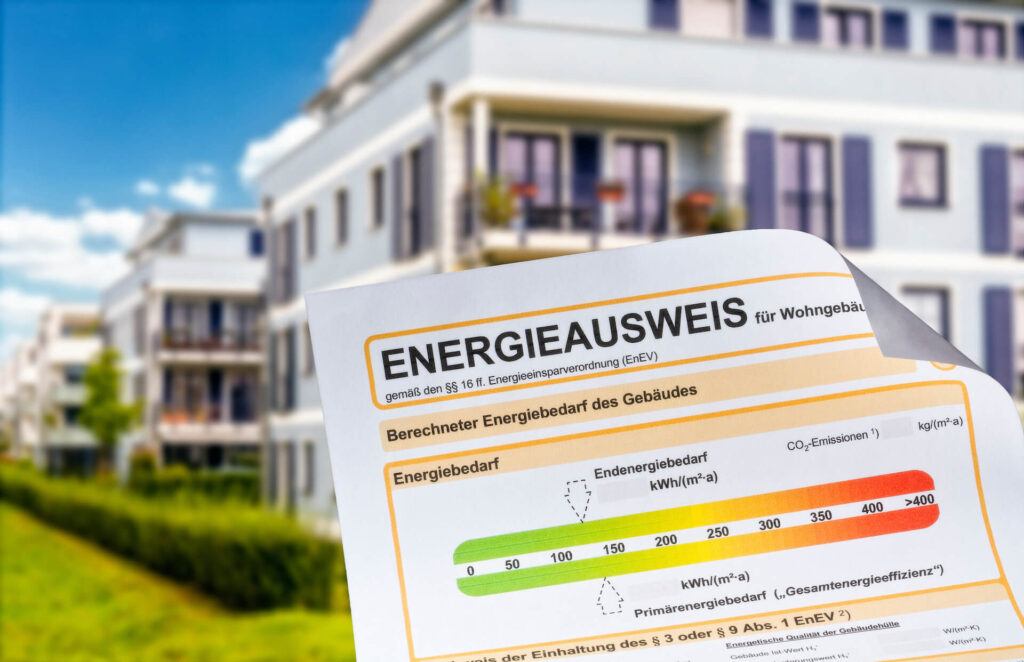What is the energy certificate?
The energy performance certificate is a document that provides information about the energy characteristics of a property. It shows either the energy requirement or the energy consumption of a building. If you, as the owner, are thinking about selling your property or renting it out, the certificate is mandatory so that potential buyers can estimate how high their energy costs will be beforehand. There are exceptions in some cases: You live in your house yourself or your house is a listed building, in which case no energy performance certificate is required. You are also exempt from the obligation for very small buildings (with a maximum usable area of 50 m²) or if you or your potential buyer want to demolish the house. If you are selling an apartment and not a house, you are not solely responsible for drawing up the energy performance certificate, but it is the duty of all owners of the building.
A basic distinction is made between the demand-oriented and consumption-oriented energy performance certificate. The consumption-based certificate shows the actual energy consumption over the last three years, while the demand-based certificate is based on the theoretical energy requirement. This means that if you own a property for which you can show less than three billing periods of energy costs, you must present a needs-based certificate. This is the case, for example, if it is a new build or your property has been empty for a long time. The same applies if you have a house that has not yet been renovated to make it more energy efficient and the building application was submitted before November 1, 1977.
The energy performance certificate informs you about the energy efficiency class of your building from A+ (very good efficiency) to H (poor efficiency) - similar to what you already know from household electrical appliances such as washing machines or fridges. The traffic light system has proved its worth here. If the arrow is in the green zone, energy consumption is low. If it is yellow or red, there is medium to high potential for optimization and energy costs will certainly be higher.
Who issues the energy performance certificate when selling a house?
According to the law, only appropriately certified specialists may issue an energy performance certificate. These include architects, building technicians and civil engineers, tradesmen from the heating system construction industry, trained energy consultants and chimney sweeps. At Isar Estate, we know competent and reliable experts in our network. Acting on your own initiative is not only forbidden: In addition to an invalid energy performance certificate, you could face fines of up to 10,000 euros in the worst case.
How much does it cost to create an energy performance certificate?
On the one hand, the costs depend heavily on whether you need a consumption-based or needs-based certificate. On the other hand, experts often set their own prices based on factors that take into account how complex the structural or heating situation of your home is. As a rough guide, you can expect the following costs:
- Consumption-oriented energy certificate: between 50 and 100 euros
- Demand-oriented energy certificate: between 300 and 1,000 euros
How long is an energy certificate valid for
The energy performance certificate is generally valid for a maximum of 10 years. However, there are cases where a new certificate is required. For example, if you have carried out renovations in the meantime that affect the energy efficiency of your home (new insulation or a new heating system), you will need a new energy performance certificate sooner. Older certificates such as the heat certificate or building energy passports may also still be valid. Please contact us if you are unsure whether your certificate is still valid.
What documents do I need for the energy certificate?
If you only require a consumption certificate, the following documents are relevant for you:
- Address
- Year of construction of the building
- Energy bills for hot water and heating for the last three billing years
- Information on the living space of the building
- Year of construction of the heating system
- Information on any vacancies
You should have the following information to hand for a needs-based certificate:
- Address
- Year of construction of the building
- Building type
- Building dimensions (dimensioned floor plans, sections and views)
- Building fabric
- Technical equipment
- Digital photo of the building and photos of the modernized exterior components
- For refurbishments or modernizations: Information on the scope and year of implementation
- Energy sources, heating surfaces and technology
- Lighting
- Ventilation and air conditioning systems
Conclusion
As the energy performance certificate is now mandatory for most residential buildings when renting or selling, you should definitely look into it as the owner of a house. Depending on the type of building you own, you may have to present a needs-based or consumption-based energy performance certificate when selling or renting out your property. You should therefore apply for an energy performance certificate in good time before you market your property.

